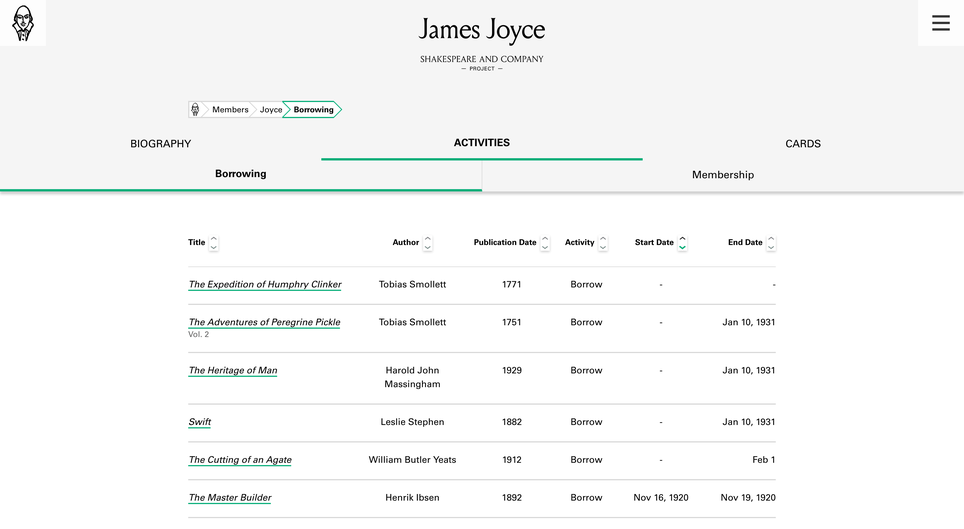Shakespeare and Company Project Recognized for Innovative Design
The Shakespeare and Company Project has often made news for shedding new light on the Lost Generation, but now, the Project’s design is in the spotlight.
Fast Company named the Project a finalist in the learning category of the 2021 Innovation by Design Awards. The Awards recognize “people, nonprofits, and companies actively working to make the world a safer, fairer, more beautiful place” through “thoughtful” design.
The Shakespeare and Company Project draws from the papers of Sylvia Beach, the owner of the Shakespeare and Company bookshop and lending library in Paris, which counted among its members James Joyce, Gertrude Stein, and other prominent writers and intellectuals.
On the Project site, users can view members’ lending library cards, trace the circulation of books and periodicals through the Shakespeare and Company community, and read essays by Project affiliates. Version 1.0 of the Project launched in spring 2020.

A screenshot from the Project site shows James Joyce’s borrowing activities as a member of the Shakespeare and Company bookshop and lending library.
The Shakespeare and Company Project is directed by Joshua Kotin, associate professor of English at Princeton, with Rebecca Sutton Koeser, lead developer at the Center for Digital Humanities, serving as Technical Lead. The Project has received multiple CDH grants, most recently earning a Project Enhancement Grant that ran from 2020 to 2021.
CDH User Experience Designer Gissoo Doroudian and her predecessor Xinyi Li led the design process.
The Project’s submission to the Innovation by Design Awards, spearheaded by Doroudian and Koeser, emphasized the mix of style and substance that typifies the design.
“The visual design of the Shakespeare and Company Project blends the modernist style of Sylvia Beach’s bookshop and lending library in interwar Paris with a contemporary emphasis on accessibility, inclusivity, and usability.”
As Doroudian and Koeser explained, the nature of Project data presented technical challenges—as well as opportunities for innovation. For instance, because Beach’s records were occasionally missing complete dates, the “development team created a solution to store partial dates in the database as date objects with a precision flag.” As a result, the site can “display the dates in multiple formats,” and users can “do time-based calculations on them, such as the duration of time a book was borrowed.”
The design also features creative details. “The display typeface Louize, chosen by . . . Li, was inspired by the Elzevir typeface used in the 1922 edition of [Joyce’s] Ulysses,” which was published under the Shakespeare and Company imprint.
The Project team is committed to engaging with a broad community of researchers and readers. Last academic year, the Project partnered with the Princeton Public Library for a series of virtual events. Currently, Kotin and Koeser are editing a special joint feature in Modernism/modernity and the Journal of Cultural Analytics, to be published next year. And the centenary of Ulysses in 2022 will likewise offer the opportunity to reexamine and reflect on the legacy of Shakespeare and Company and the world of interwar Paris illuminated by the Project.
The Shakespeare and Company Project is the second CDH-affiliated project to earn recognition in the Innovation by Design Awards. Last year, the Princeton Prosody Archive, led by CDH Faculty Director Meredith Martin, received an honorable mention in the learning category.
Want to see the Project in print?
The new issue of Fast Company hits shelves on September 28. Head to your local bookshop (or lending library) to check it out!